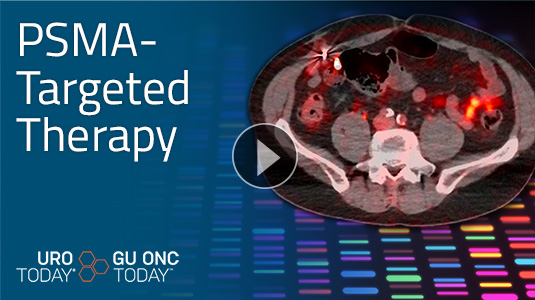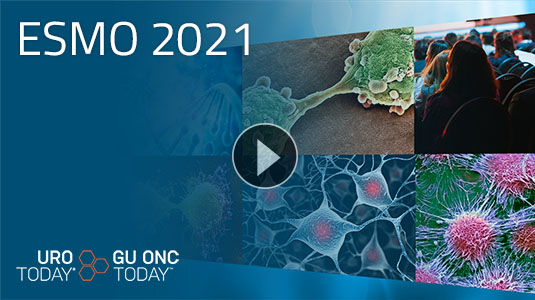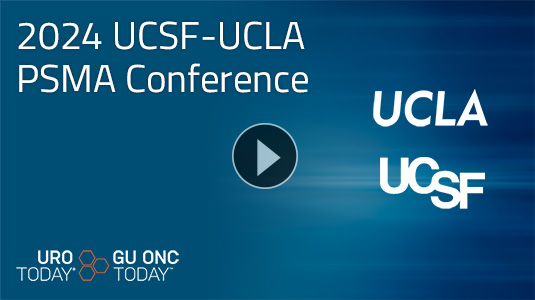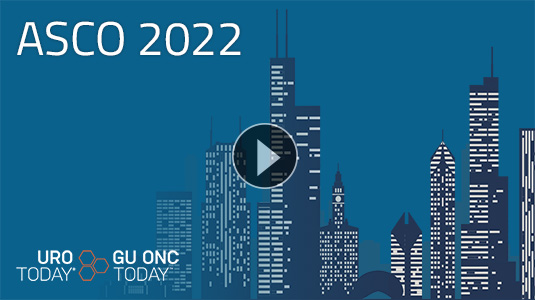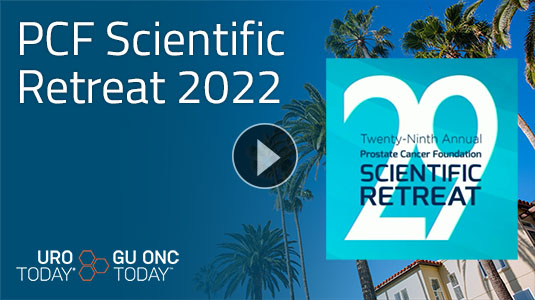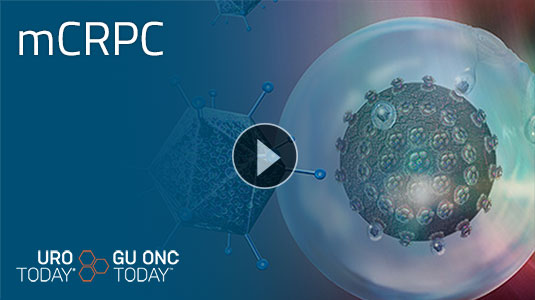SUO 2024: Evaluation of Response to 177Lu-PSMA-617 by Site Specific Disease in Metastatic Castrate-Resistant Prostate Cancer
Presented by Mohamed E. Ahmed, MD
The 2024 Society of Urologic Oncology (SUO) annual meeting held in Dallas, TX was host to a prostate cancer poster session. Dr. Mohamed Ahmed presented the results of a study assessing response to
177Lu-PSMA-617 by disease site in metastatic castrate-resistant prostate cancer (mCRPC) patients.
Read More
ESMO 2024: Invited Discussant: Efficacy of SPLASH and UpFrontPSMA Trials
Presented by Irene Burger, MD
The 2024 European Society for Medical Oncology (ESMO) Annual Congress held in Barcelona, Spain between September 13
th and 16
th, 2024 was host to a proffered paper session for prostate cancer. Professor Irene Burger provided the discussant for both SPLASH and UpFrontPSMA.
Read More
ESMO 2024: Efficacy of 177Lu-PNT2002 in PSMA-Positive mCRPC Following Progression on an Androgen-Receptor Pathway Inhibitor (SPLASH)
Presented by A. Oliver Sartor, MD
The 2024 European Society for Medical Oncology (ESMO) Annual Congress held in Barcelona, Spain was host to a proffered paper session for prostate cancer. Dr. Oliver Sartor presented the first interim results of SPLASH, a phase III trial of
177Lu-PNT2002 in PSMA-positive metastatic castrate-resistant prostate cancer (mCRPC) following progression on an androgen-receptor pathway inhibitor (ARPI).
Read More
ESMO 2024: UpFrontPSMA : A Randomized Phase II Study of Sequential 177Lu-PSMA-617 and Docetaxel versus Docetaxel in Metastatic Hormone-Sensitive Prostate Cancer
Presented by Arun Azad, PhD, MBBS, FRACP
Dr. Arun Azad presented the results of UpFrontPSMA, a randomized phase II trial of sequential
177Lu-PSMA-617 plus docetaxel versus docetaxel in metastatic hormone-sensitive prostate cancer (mHSPC). This study was concurrently published in
The Lancet Oncology on September 15, 2024.
Read More
ESMO 2024: PSMA-targeted Radioligand Therapy with 131I-LNTH-1095 Plus Enzalutamide versus Enzalutamide Alone in Chemotherapy-naïve Patients Whose Piflufolastat F 18-avid Metastatic Castration-resistant Prostate Cancer Progressed on Abiraterone: ARROW
Evan Yu presented the results of ARROW, a multicenter randomized phase II trial of PSMA-targeted radioligand therapy with
131I-LNTH-1095 plus enzalutamide versus enzalutamide alone in chemotherapy-naïve metastatic castrate-resistant prostate cancer (mCRPC) patients with disease progression on abiraterone and positive piflufolastat F 18 scans.
Read More
ESMO 2024: Prostate Cancer Working Group 4 Preliminary Criteria Using Serial PSMA PET/CT for Response Evaluation: Analysis from the PRINCE Trial
Presented by Michael S. Hofman, MBBS (Hons), FRACP, FAANMS
The 2024 ESMO annual meeting included a session on prostate cancer, featuring a presentation by Dr. Michael Hofman discussing Prostate Cancer Working Group 4 (PCWG4) preliminary criteria using serial PSMA PET/CT for response evaluation.
Read More
ESMO 2024: Will Theranostics Become Standard of Care?
Presented by Silke Gillessen Sommer, MD
The 2024 European Society of Medical Oncology (ESMO) Annual Congress held in Barcelona, Spain was host to the session Therapeutic options beyond AR pathway inhibitors: What do we choose next? Dr. Silke Gillessen discussed the role of theranostics after ARPIs and questioned if these will become the next standard of care.
Read More
SNMMI 2024: 68Ga-P16-093 Diagnostic Performance in Newly Diagnosed Prostate Cancer- Histopathologic Correlation
Presented by Jiarou Wang, MD
At the 2024 SNMMI annual meeting Dr. Jiarou Wang discussed the diagnostic performance of
68Ga-P16-093 in newly diagnosed prostate cancer.
68Ga-P16-093 is a novel PSMA-targeted radiopharmaceutical that has a labeling reaction compatible with various Ge/Ga generators and has a simple labeling method of heating at 95 degrees Celsius for 5 minutes, leading to high radiochemical purity. As a targeting agent in prostate cancer patients,
Read More
SNMMI 2024: Eligibility for PSMA-RLT Based on Dual FDG/PSMA-PET: A Subanalysis of the 3TMPO Study
Presented by Jean-Mathieu Beauregard, MD, MSc, FRCPC
The 2024 SNMMI annual meeting featured a session on prostate cancer, and a presentation by Dr. Jean-Mathieu Beauregard discussing a sub-analysis of the 3TMPO study assessing eligibility for PSMA radioligand therapy based on dual FDG/PSMA-PET. Eligibility criteria for PSMA radioligand therapy are currently debated, particularly with respect to the role of FDG-PET in patient selection.
Read More
SNMMI 2024: Dosimetry and Pilot Therapy Study of Novel PSMA-Targeting Agents, 177Lu-P17-087 and 177Lu-P17-088, in Metastatic Castration-Resistant Prostate Cancer Patients
Presented by Linlin Li, PhD
The 2024 SNMMI annual meeting featured a session on prostate cancer, and a presentation by Dr. Linlin Li discussing the dosimetry and pilot therapy study of novel PSMA-targeting agents,
177Lu-P17-087 and
177Lu-P17-088, in metastatic castration-resistant prostate cancer patients.
Read More
SNMMI 2024: Combination Treatment of Prostate Cancer Using Pembrolizumab with PSMA Based Radioligands
Presented by Thomas Hope, MD
The 2024 SNMMI annual meeting was host to the session Novel Approaches and Combination Therapies; Pre-Targeting Approaches. Dr. Thomas Hope discussed the combination treatment of prostate cancer using Pembrolizumab with PSMA-based radioligands.
Read More
SNMMI 2024: Safety, Tolerability, and Dosimetry of TLX591 with Best Standard of Care in Patients with PSMA-Expressing Metastatic Castration Resistant Prostate Cancer: ProstACT SELECT Preliminary Results
Presented by Nat Lenzo, MD, EMBA, FRACP, FAANMS, GAICD
At the 2024 SNMMI annual meeting, Dr. Nat Lenzo presented preliminary results of ProstACT SELECT, specifically the safety, tolerability, and dosimetry of TLX591 with best standard of care in patients with PSMA-expressing metastatic castration resistant prostate cancer.
Read More
SNMMI 2024: Saul Hertz’s Theranostic Dream is Shaping the Future of Cancer Care: Bridging Evidence-Based Medicine and Precision Oncology
Presented by Michael S. Hofman, MBBS (Hons), FRACP, FAANMS, FICI
The 2024 SNMMI annual meeting featured the Therapy Center of Excellence Saul Hertz Lecture and Award, and a presentation by Dr. Michael Hofman discussing bridging evidence-based medicine and precision oncology. Saul Hertz (1905-1950) conceived and brought from bench to bedside radioactive iodine for medical uses based on the 1936 question “Could iodine be made radioactive artificially?” This was followed by the 1937 radioactive iodine studies assessing thyroid physiology, tracer qualities, dosimetry, and thyroid carcinoma.
Read More
SNMMI 2024: Novel Approaches of Combination PSMA-Based Radiopharmaceutical Treatments for Prostate Cancer
Presented by James Buteau, MD, FRACP, FRCPC
Th SNMMI 2024 Annual Meeting was host to a prostate cancer novel approaches and combination therapies session. Dr. James Buteau discussed novel approaches of combination PSMA-based radiopharmaceutical treatments for prostate cancer.
Read More
SNMMI 2024: Analysis of the Prospective ProsTIC Registry
Presented by David Chen, PhD
At the SNMMI 2024 Annual Meeting, David Chen presented the results of a prospective analysis of the ProsTIC registry evaluating the oncologic and quality-of-life outcomes of metastatic castration-resistant prostate cancer (mCRPC) patients with a stable or poor initial PSA response to [
177Lu]Lu-PSMA-617, and the prognostic value of baseline imaging biomarkers and dosimetry.
Read More
SNMMI 2024: Effect of Bone Marrow Disease on Hematologic Toxicity and PSA Response to 177Lu-PSMA-617 Therapy
Presented by Meryam Losee, BS
At the SNMMI 2024 Annual Meeting, Dr. Meryam Losee presented the results of a study evaluating the effect of bone marrow disease on hematologic toxicity and PSA response to
177Lu-PSMA-617 therapy.
Read More
SNMMI 2024: 225Ac-PSMA / 177Lu-PSMA Tandem Therapy for Metastatic Castration-Resistant Prostate Cancer – A Prospective Phase 3 Randomized Study from Azerbaijan
Presented by Fuad Novruzov, MD, PhD
At the SNMMI 2024 Annual Meeting Dr. Fuad Novruzov presented the results of a prospective phase 3 randomized study from Azerbaijan evaluating
225Ac-PSMA +
177Lu-PSMA tandem therapy for metastatic castration-resistant prostate cancer (mCRPC).
Read More
SNMMI 2024: Efficacy and Toxicity of 177Lu-PSMA-617 for Metastatic Castration-Resistant Prostate Cancer in a Real-World Setting: Results from the U.S. Expanded Access Program and Comparison with Phase 3 VISION Data
Presented by Vishnu Murthy
At the SNMMI 2024 Annual Meeting Vishnu Murthy presented the results of a US expanded access program evaluating the efficacy and toxicity of
177Lu-PSMA-617 for metastatic castration-resistant prostate cancer (mCRPC) in a real-world setting and compared these results to those from the phase 3 VISION trial.
Read More
SNMMI 2024: PSMA RLT: Is Earlier Better?
Presented by Oliver Sartor, MD
The SNMMI 2024 Annual Meeting was host to a prostate-specific membrane antigen (PSMA) radioligand therapy (RLT) tumor board session. Dr. Oliver Sartor discussed whether earlier use of PSMA RLT in earlier settings is of clinical benefit.
Read More
ASCO 2024: Baseline ctDNA Analyses and Associations with Outcomes in Taxane-Naive Patients with mCRPC Treated with 177Lu-PSMA-617 Versus Change of ARPI in PSMAfore
Presented by Johann S. De Bono, MD, MSc, PhD, FRCP, FMedSci
The 2024 ASCO annual meeting featured a session on prostate cancer, and a presentation by Dr. Johann De Bono discussing baseline ctDNA analyses and associations with outcomes in taxane-naive patients with metastatic castration-resistant prostate cancer (mCRPC) treated with
177Lu-PSMA-617 versus change of androgen receptor pathway inhibitor in PSMAfore.
Read More
ASCO 2024: PSMAfore: HRQoL and Pain in a Phase 3 Study of 177Lu-PSMA-617 in Taxane-Naïve Patients with mCRPC
Presented by Karim Fizazi, MD, PhD
The 2024 ASCO featured a session on prostate cancer, and a presentation by Dr. Karim Fizazi discussing results from PSMAfore, specifically health-related quality of life and pain among taxane-naïve metastatic castration-resistant prostate cancer (mCRPC) patients treated with
177Lu-PSMA-617.
Read More
AUA 2024: Paradigm-Shifting, Practice-Changing Clinical Trials in Urology: PSMAfore: Efficacy of 177Lu-PSMA-617 Versus ARPI Change in Taxane-Naïve Patients with Metastatic Castration-Resistant Prostate Cancer by Pre-Randomization ARPI
Presented by Xiao Wei, MD, MAS
The 2024 AUA annual meeting featured a plenary session, and a presentation by Dr. Xiao Wei discussing results from PSMAfore assessing the efficacy of
177Lu-PSMA-617 versus ARPI change in taxane naïve patients with metastatic castration resistant prostate cancer (mCRPC) stratified by pre-randomization ARPI.
Read More
ASCO GU 2024: Association Between PET-Based TheraP Eligibility and 177Lu-PSMA-617 Outcomes in VISION-Eligible Patients with mCRPC
Presented by Ridvan Arda Demirci, MD
The 2024 GU ASCO annual meeting featured a prostate cancer session and a presentation by Dr. Ridvan Demirci discussing the association between PET-based TheraP eligibility and
177Lu-PSMA-617 outcomes in VISION-eligible patients with metastatic castration-resistant prostate cancer (mCRPC).
Read More
ASCO GU 2024: Building a Predictive Model for Outcomes with [177Lu]Lu-PSMA-617 in Patients with Metastatic Castration-Resistant Prostate Cancer Using VISION Data: Preliminary Results
Presented by Ken Herrmann, MD
The 2024 ASCO GU cancers symposium was host to a prostate cancer poster session. Dr. Ken Herrmann presented the preliminary results of a predictive model for treatment outcomes with [177Lu]Lu-PSMA-617 in patients with metastatic castration-resistant prostate cancer (mCRPC), using data from the phase III VISION trial.
Read More
PSMA PET and RLT 2024: PSMA Radioligand Therapy: The VISION and TheraP Trials
Presented by Michael Morris, MD
The 2024 PSMA conference featured a presentation by Dr. Michael Morris discussing the VISION
1 and TheraP
2 trials. Dr. Morris started by discussing the VISION trial, an international, randomized, open-label phase III study evaluating
177Lu-PSMA-617 in men with PSMA-positive mCRPC who had previously received treatment with a next-generation androgen receptor signaling inhibition (abiraterone, enzalutamide, etc) and one or two prior lines of taxane chemotherapy.
Read More
ESMO 2023: PSMAfore Discussant: Using Clinical Intelligence to Define First Line mCRPC Therapy
Presented by Christopher Sweeney, MBBS
The 2023 ESMO annual meeting included a Presidential session, featuring a discussant presentation by Dr. Christopher Sweeney discussing the PSMAfore phase 3 trial. Dr. Sweeney started by highlighting that there are several clear strengths of the PSMAfore trial
Read More
ESMO 2023: PSMAfore Phase 3 Trial of [177Lu]Lu-PSMA-617 in Taxane-Naive Patients with Metastatic Castration Resistant Prostate Cancer
Presented by A. Oliver Sartor, MD
The 2023 ESMO annual meeting included a Presidential session, featuring a presentation by Dr. Oliver Sartor discussing results of PSMAfore, a phase 3 trial of
177Lu-PSMA-617 in taxane-naive patients with metastatic castration-resistant prostate cancer (mCRPC).
Read More
ESMO 2023: Prognostic Value of Neutrophil-to-Lymphocyte Ratio and Lymphopenia in Patients with mCRPC Treated with 177Lu-PSMA-617: VISION Post Hoc Analysis
Presented by Xiao X. Wei, MD, MAS
The 2023 ESMO annual meeting included a session on prostate cancer, featuring a presentation by Dr. Xiao Wei discussing a post hoc analysis of the VISION trial assessing the prognostic value of neutrophil-to-lymphocyte ratio and lymphopenia in patients with metastatic castration-resistant prostate cancer (mCRPC) treated with
177Lu-PSMA-617.
Read More
ESMO 2023: Association of Health-Related Quality of Life with Efficacy Outcomes in the VISION Study of Patients with mCRPC
Presented by Michael Morris, MD
The 2023 ESMO annual meeting included a session on prostate cancer, featuring a presentation by Dr. Michael Morris discussing the association of health-related quality of life with efficacy outcomes in the VISION study of patients with metastatic castration-resistant prostate cancer (mCRPC). Read More
SNMMI 2023: Extension of a 68Ga-PSMA PET-Based Nomogram for Outcome Prediction of 177Lu-PSMA Radioligand Therapy for the Use of 18F-rhPSMA -7.3
Presented by Isabel Rauscher, MD
The 2023 SNMMI annual meeting included a prostate cancer session, featuring a presentation by Dr. Isabel Rauscher discussing the extension of a
68Ga-PSMA PET-based nomogram for outcome prediction of
177Lu-PSMA radioligand therapy for the use of
18F-rhPSMA -7.3.
Read More
SNMMI 2023: Dual PSMA/FDG PET/CT for Assessing Eligibility and Predicting Response in mCRPC Patients Undergoing 177Lu-PSMA-617 Radioligand Therapy: A Post-VISION Analysis
Presented by Anushna S. Babu, MD
The 2023 SNMMI annual meeting included a prostate cancer session, featuring a presentation by Dr. Anushna Babu discussing dual PSMA/FDG PET/CT for assessing eligibility and predicting response in mCRPC patients undergoing
177Lu-PSMA-617 radioligand therapy.
Read More
ASCO 2023: PSMAddition: A Phase 3 Trial to Compare Treatment with 177Lu-PSMA-617 + Standard of Care and Standard of Care Alone in Patients with mHSPC
Presented by Scott T. Tagawa, M.D., MS, FACP
The 2023 ASCO annual meeting included a prostate cancer session, featuring a trials in progress presentation by Dr. Scott Tagawa discussing PSMAddition, a phase 3 trial comparing
177Lu-PSMA-617 + standard of care and standard of care alone in patients with metastatic hormone-sensitive prostate cancer (mHSPC).
Read More
ASCO 2023: Building a Predictive Model for Outcomes with 177Lu-PSMA-617 in Patients with mCRPC Using VISION Data: Preliminary Results
Presented by Ken Herrmann, MD
The 2023 ASCO annual meeting included a prostate cancer session, featuring a presentation by Dr. Ken Herrmann discussing preliminary results of building a predictive model for outcomes with
177Lu-PSMA-617 in patients with metastatic castration-resistant prostate cancer (mCRPC) using VISION data.
Read More
ASCO 2023: Tumor Dosimetry of 177Lu-PSMA-617 for the Treatment of mCRPC: Results from the VISION Trial Sub-Study
Presented by Prof. Bernd J. Krause
The 2023 ASCO annual meeting included a prostate cancer session, featuring a presentation by Dr. Bernd Krause discussing a VISION trial sub-study analysis assessing tumor dosimetry of
177Lu-PSMA-617 for the treatment of metastatic castration-resistant prostate cancer (mCRPC).
Read More
ASCO 2023: Effects of 177Lu-PSMA-617 on Overall Survival in TheraP versus VISION Randomized Trials: An Exploratory Analysis
Presented by Yu Yang Soon, NHMRC
The 2023 ASCO annual meeting included a prostate cancer session, featuring a presentation by Dr. Yu Yang Soon discussing an exploratory analysis of the effects of
177Lu-PSMA-617 (LuPSMA) on overall survival in TheraP versus VISION randomized trials.
Read More
ASCO 2023: Building a Predictive Model for Outcomes with 177Lu-PSMA-617 in Patients with mCRPC Using VISION Data: Preliminary Results
Presented by Ken Herrmann, MD
The 2023 ASCO annual meeting included a prostate cancer session, featuring a presentation by Dr. Ken Herrmann discussing preliminary results of building a predictive model for outcomes with
177Lu-PSMA-617 in patients with metastatic castration-resistant prostate cancer (mCRPC) using VISION data.
Read More
ASCO GU 2023: Increased Utilization of Prostate-Specific Membrane Antigen (PSMA)-Targeted Radionuclide Therapy (PSMA-TRT) in African American (AA) Patients at an Academic Medical Center
Presented by Joseph Earl Thomas, MD
The 2023 ASCO GU cancers was host to a prostate cancer poster session. Dr. Joseph Thomas presented his group’s study evaluating the increased utilization of prostate-specific membrane antigen (PSMA)-targeted radionuclide therapy (PSMA-TRT) in African American (AA) patients at their Academic Medical Center.
Read More
ESMO 2022: Radiographic Progression-Free Survival Correlation with Time-to-Event Endpoints: A Post Hoc Analysis of the VISION Trial
Presented by Michael Morris, MD
In the Prostate Cancer poster session of the ESMO Annual Congress, Dr. Morris presented a post-hoc analysis of the VISION trial aimed at assessing earlier maturing time-to-event endpoints.
Read More
ASCO 2022: Tolerability of [177Lu]Lu-PSMA-617 By Treatment Exposure in Patients With Metastatic Castration-Resistant Prostate Cancer: A VISION Study Subgroup Analysis
Presented by Scott T. Tagawa, MD
At the 2022 ASCO Annual Meeting, the poster session focused on Prostate, Testicular, and Penile cancers on Monday afternoon included a presentation from Dr. Scott T. Tagawa discussing the tolerability of theranostic treatment with 177Lu-PSMA among men with metastatic castration-resistant prostate cancer (mCRPC), stratified by their treatment exposure, in men treated within the VISION trial.
Read More
ASCO 2022: Outcome of Patients With PSMA PET/CT Screen Failure by VISION Criteria and Treated With 177Lu-PSMA Therapy: A Multicenter Retrospective Analysis
Presented by Masatoshi Hotta, MD, PhD
At the 2022 ASCO Annual Meeting, the poster session focused on Prostate, Testicular, and Penile cancers and included a presentation from Dr. Masatoshi Hotta discussing outcomes of theranostic treatment with 177Lu-PSMA, among patients who would be deemed ineligible for therapy according to criteria used for inclusion in the VISION trial.
Read More
ASCO 2022: [177Lu]Lu-PSMA-617 in PSMA-Positive Metastatic Castration-Resistant Prostate Cancer: Prior and Concomitant Treatment Subgroup Analyses of the VISION Trial
Presented by Nitin Vaishampayan, MD, BA
At the 2022 ASCO Annual Meeting, the oral abstract session focused on Prostate, Testicular, and Penile cancers on Sunday morning included a presentation from Dr. Nitin Vaishampayan discussing subgroup analyses of the VISION trial examining 177Lu-PSMA-617 in men with heavily pre-treated metastatic castration-resistant prostate cancer (mCRPC).
Read More
ASCO 2022: [68Ga]Ga-PSMA-11 PET Baseline Imaging as a Prognostic Tool for Clinical Outcomes to [177Lu]Lu-PSMA-617 in Patients With mCRPC: A VISION Substudy
Presented by Andrew J. Armstrong, MD, MSc
At the 2022 ASCO Annual Meeting, the oral abstract session focused on Prostate, Testicular, and Penile cancers on Sunday morning included a presentation from Dr. Andrew J. Armstrong discussing the prognostic value of baseline [68Ga]Ga-PSMA-11 PET imaging in men undergoing theranostic treatment with 177Lu-PSMA-617 for heavily pre-treated metastatic castration-resistant prostate cancer (mCRPC) in the VISION trial.
Read More
ASCO GU 2022: PSMAfore: A Phase 3 Study To Compare 177Lu-PSMA-617 Treatment With a Change in Androgen Receptor Pathway Inhibitor in Taxane-Naïve Patients With Metastatic Castration-Resistant Prostate Cancer
Presented by A. Oliver Sartor, MD
A. Oliver Sartor presented the rationale and design of the PSMAfore trial. PSMAfore is a multicenter, open-label, randomized phase 3 trial in adult men with progressive mCRPC and confirmed PSMA expression by [68Ga]Ga-PSMA-11 PET/CT. Eligible patients must be taxane-naïve in the metastatic setting and have received one prior ARPI and be a candidate for a change in ARPI.
Read More
ASCO GU 2022: Community Oncologists’ Perceptions of and Barriers To Access for 177LU-PSMA-617 in Metastatic Castration-Resistant Prostate Cancer
Presented by Ajeet Gajra FACP, MD
Dr. Garja presented a poster focused on understanding how community-based medical oncologists plan to integrate 177Lu-PSMA-617 into patient management. How 177Lu-PSMA-617 approval will affect the treatment landscape of mCRPC depends on how community-based medical oncologists uptake this new treatment approach.
Read More
ASCO GU 2022: Dosimetry of 177Lu-PSMA-617 for the Treatment of Metastatic Castration-Resistant Prostate Cancer: Results From the VISION Trial Sub-Study
Presented by Ken Herrmann, MD, MBA
During the 2022 GU ASCO Cancer Symposium, Dr. Herrmann presented a poster assessing [177Lu]Lu-PSMA-617 (177Lu-PSMA-617) dosimetry among patients treated on the phase 3 VISION trial (NCT03511664).
Read More
ASCO GU 2022: Improvements in Symptoms Related to Bone Metastasis in Recipients of Lutetium-177 PSMA-617 for Prostate Cancer
Presented by Brian Gonzalez PhD
During the ASCO GU Symposium 2022, Dr. Gonzalez presented work on patient-reported quality of life metrics among men receiving prostate-specific membrane antigen (PSMA) radioligand therapy (RLT) for the treatment of metastatic castration-resistant prostate cancer (mCRPC).
Read More
SUO 2021: VISION Trial: Integrating PSMA-Targeted Therapy for Advanced Prostate Cancer
Presented by Michael J. Morris, MD
(UroToday.com) The Society of Urologic Oncology (SUO) annual winter meeting included an advanced prostate cancer session and a presentation by Dr. Michael Morris discussing the VISION trial and integration of PSMA-targeted therapy for advanced prostate cancer.
Read More
SUO 2021: PSMA Imaging and Outcome Following Dose-Intense PSMA-Targeted Radionuclide Therapy in Men with PSMA-Unselected, Pre-Treated, Metastatic Castration-Resistant Prostate Cancer
Presented by Scott T. Tagawa
(UroToday.com) PSMA-targeted radionuclide therapy (TRT) is one of the most promising investigational therapies in prostate cancer currently. In the phase II TheraP trial and the phase III VISION trial, 177-lutetium-PSMA-617 has demonstrated better outcomes compared to the current standard of care treatment options for patients who have received many lines of therapy for metastatic castration resistant prostate cancer (mCRPC).
Read More
APCCC 2021: Contagious Enthusiasm in PSMA-Driven Therapeutics
Presented by Eleni Efstathiou, MD
The APCCC 2021 meeting session discussing PSMA in diagnostics and therapy included a presentation by Dr. Eleni Efstathiou discussing the contagious enthusiasm of PSMA-driven therapeutics.
Read More
APCCC 2021: Best Use of Lutetium-PSMA and Where To Put It in Sequencing Therapies Including Treatment Monitoring
Presented by Charles Ryan, MD
The Advanced Prostate Cancer Consensus Conference 2021 virtual meeting session discussing PSMA in diagnostics and therapy included a presentation by Dr. Charles Ryan discussing the best use of Lutetium-PSMA and where to place it when sequencing therapies, including treatment monitoring.
Read More
ESMO 2021: PSMAfore: A Phase 3 Study to Compare 177Lu-PSMA-617 Treatment with a Change in Androgen Receptor Pathway Inhibitor in Taxane-Naïve Patients with mCRPC
Presented by Michael J. Morris, MD
(UroToday.com) Lutetium-177 is a radioligand that when bound to a prostate-specific membrane antigen (PSMA) targeting molecule delivers beta-particle radiation to PSMA-expressing cells and their local microenvironment.
Read More
ESMO 2021: Health-Related Quality of Life, Pain and Safety Outcomes in the Phase 3 VISION Study of 177Lu-PSMA-617 in Patients with mCRPC
Presented by Karim Fizazi, MD, PhD
The ESMO 2021 annual meeting’s prostate cancer mini oral session included a presentation by Dr. Karim Fizazi discussing health-related quality of life, pain, and safety outcomes in the phase 3 VISION study. [177Lu]Lu-PSMA-617 (
177Lu-PSMA-617) delivers β-particle radiation to prostate-specific membrane antigen (PSMA) expressing cells and the surrounding microenvironment.
Read More
ESMO 2021: Patient-Reported Outcomes in Prostate Cancer Patients Receiving PSMA-Targeted Radionuclide Therapy
Presented by Brian D. Gonzalez, PhD
(UroToday.com) The European Society of Medical Oncology (ESMO) 2021 annual meeting’s prostate cancer session included a presentation by Dr. Brian Gonzalez discussing patient-reported outcomes in prostate cancer patients receiving prostate-specific membrane antigen (PSMA) radionuclide therapy. PSMA targeted radionuclide therapy is a promising investigational therapy for patients with progressive metastatic castration-resistant prostate cancer (mCRPC), conjugating a radionuclide emitting alpha radiation (e.g., Actinium-225) or beta radiation (e.g., Lutetium-177) to a small molecule ligand (e.g., PSMA-617) or a monoclonal antibody (e.g., J591) that has an affinity for PSMA.
Read More
ESMO 2021: Comparing 177Lu-PSMA-617 Treatment with Androgen Receptor Pathway Inhibitor Switch in Taxane-Naïve mCRPC: Findings from the PSMAfore Phase 3 Study
Presented by Michael Morris, MD
In the on-demand poster session of the ESMO Annual Congress, Dr. Morris provided a summary of the PSMAfore trial in progress (NCT04689828). This study examines the role of [177Lu]Lu-PSMA-617 (177Lu-PSMA-617) in taxane-naïve patients with mCRPC.
Read More
ESMO 2021: Final Results of Phase I/II Trial of Fractionated Dose 177Lu-PSMA-617 for Metastatic Castration-Resistant Prostate Cancer (mCRPC)
Presented by Scott T. Tagawa, MD
(UroToday.com) In the on-demand poster session of the European Society for Medical Oncology (ESMO) Annual Congress, Dr. Scott Tagawa reported results of a phase I/II study of dose-escalation study of a fractionated (dose-dense) treatment regime of 177Lu-PSMA-617 for metastatic castration-resistant prostate cancer (mCRPC). Previously reported, the initial phase I data from this study demonstrated no evidence of short-term dose-limiting toxicity.
Read More
ESMO 2021: PSMAddition: A Phase 3 Trial to Compare Treatment with 177Lu-PSMA-617 plus Standard of Care (SOC) Versus SOC Alone in Patients with Metastatic Hormone-Sensitive Prostate Cancer
Presented by Scott T. Tagawa, MD
(UroToday.com) In the on-demand poster session of the European Society for Medical Oncology (ESMO) Annual Congress, Dr. Scott Tagawa presented a trial in poster summary of the PSMAddition trial. This trial was launched given the proven benefits of [177Lu]Lu-PSMA-617 (177Lu-PSMA-617). 177Lu-PSMA-617 is a high-affinity prostate-specific membrane antigen (PSMA)-targeted radioligand therapy that delivers β-particle radiation to cells that express PSMA, as well as the surrounding microenvironment.
Read More
AUA 2021: Long-Term Follow-up and Prognostic Factor Analysis in Men with mCRPC Who Receive PSMA-Targeted Lutetium-177 (177Lu)
Presented by Scott Tagawa, MD
(UroToday.com) The advanced prostate cancer session at the 2021 American Urologic Association (AUA) annual meeting included a presentation by Dr. Scott Tagawa who discussed long-term follow-up and prognostic factor analysis among men with mCRPC who received
177Lu-PSMA therapy. PSMA-targeted radionuclide therapy has recently emerged as a promising treatment modality for advanced prostate cancer.
Read More
EAU 2021: Treatment Options That Offer a Survival Benefit in mCRPC Discussion: The TheraP and VISION Trials
Presented by Silke Gillessen, MD
Silke Gillessen discussed the recently published TheraP
1 and VISION
2 trials. Dr. Gillessen notes that in the metastatic castration-resistant prostate cancer (mCRPC) setting, we now have several treatment options that offer a survival benefit, including abiraterone, cabazitaxel, docetaxel, enzalutamide, radium-223, sipuleucel-T, olaparib, and now
177Lu-PSMA-617.
Read More
EAU 2021: PSMA In Diagnostics and Treatment
Presented by Karim Fizazi, MD, Ph.D
Dr. Karim Fizazi finished off the thematic session of Treatment Sequencing in Metastatic Prostate Cancer with a presentation on the role of PSMA in diagnostics and treatment of metastatic prostate cancer.
Read More
EAU 2021: An Overview of Systemic Treatment Options for mCRPC
Presented by Gero Kramer, MD
(UroToday.com) Dr. Gero Kramer reviews the systemic treatment options for metastatic castration-resistant prostate cancer (mCRPC) and highlights some recent developments.
Read More
EAU 2021: Phase 3 Study of 177Lu-PSMA-617 in Patients with Metastatic Castration-Resistant Prostate Cancer (VISION)
Presented by Johann De Bono, MD, MSc, Ph.D., FRCP, FMedSci
The EAU 2021 Annual Meeting included a presentation by Johann De Bono discussing the VISION trial, a phase 3 study of
177Lu-PSMA-617 in patients with mCRPC. As PSMA is highly expressed in prostate cancer and mCRPC lesions, the combination of PSMA-617 with the beta-emitter lutetium allows for the targeted delivery of ß-particle radiation to PSMA-expressing cells and the surrounding microenvironment.
Read More
SNMMI 2021: The Phase 3 VISION Trial: Evaluating the Efficacy of 177-Lu-PSMA (LuPSMA) in the Treatment of Patients with PSMA-Positive mCRPC
Presented by Michael Morris, MD
(UroToday.com) There has been a dramatic and rapid proliferation of systemic therapy options in advanced prostate cancer since the introduction of docetaxel for metastatic castration resistant prostate cancer (mCRPC) in 2004. These newer treatments have included a number of novel hormonal therapies (including abiraterone acetate and enzalutamide),
Read More
SNMMI 2021: 225Ac-PSMA-617 Targeted Alpha Therapy in Metastatic Castration Resistant Prostate Cancer Patients
Presented by Madhav P. Yadav, MD
(UroToday.com) Beginning with the introduction of docetaxel for metastatic castration resistant prostate cancer (mCRPC) in 2004, there has been a dramatic and rapid proliferation of systemic therapy options in advanced prostate cancer including a number of novel hormonal therapies (including abiraterone acetate and enzalutamide), second-line chemotherapy (cabazitaxel), bone-targeting agents (radium-223) and other targeted agents (including olaparib, rucaparib, and pembrolizumab), each of which has proven survival benefits.
Read More
SNMMI 2021: Alpha Emitting PSMA Molecular Radiotherapy for mCRPC
Presented by Hossein Jadvar, MD
(UroToday.com) The Society of Nuclear Medicine & Molecular Imaging (SNMMI) 2021 annual meeting included a metastatic castrate-resistant prostate cancer (mCRPC) session and a presentation by Dr. Hossein Jadvar discussing alpha-emitting PSMA molecular radiotherapy in mCRPC. Dr. Jadvar notes that the lethal potency of alpha particles includes
Read More
ASCO 2021: VISION Study Results Discussion: Lutetium-177-PSMA-617 in Patients With Metastatic Castration-Resistant Prostate Cancer
Presented by Mary-Ellen Taplin, MD
(UroToday.com) Dr. Taplin began her discussion of the VISION trial by first reviewing the current therapeutic landscape of prostate cancer. While there are many life-prolonging options, unfortunately, the duration of response to these therapies in sequence is often short. The VISION trial was set up to evaluate the use of lutetium-PSMA in late-stage advanced prostate cancer
Read More
ASCO 2021: VISION Study Results – Phase III Study of Lutetium-177-PSMA-617 in Patients With Metastatic Castration-Resistant Prostate Cancer
Presented by Michael J. Morris, MD
(UroToday.com) In this presentation, Dr. Michael Morris presented the results of the phase 3 VISION trial evaluating the radiopharmaceutical lutetium-PSMA (Lu-PSMA) in patients with metastatic castration-resistant prostate cancer.
Read More
ASCO 2021: Applying the Results of the Phase III VISION Trial, Lutetium-177-PSMA-617 in Patients with Metastatic Castration-Resistant Prostate Cancer to Clinical Practice - Discussion
Presented by Mary-Ellen Taplin, MD
Following Micheal Morris’s presentation of the
results of the phase III VISION trial of lutetium-177-PSMA-617 in patients with metastatic castration-resistant prostate cancer in the Plenary Session of the 2021 ASCO, Dr. Mary-Ellen Taplin from the Dana Farber Cancer Institute provided a discussant overview of these data and helped to contextualize how we may apply them to our practices.
Read More
ASCO 2021: Phase III Study of Lutetium-177-PSMA-617 in Patients with Metastatic Castration-Resistant Prostate Cancer (VISION)
Presented by Micheal Morris, MD
In a plenary presentation at the 2021 ASCO Annual Meeting, Dr. Morris presented the first results of the VISION trial, a phase III study assessing lutetium-177-PSMA-617 in patients with metastatic castration-resistant prostate cancer.
Read More
ASCO GU 2021: Lighting the Way: Lutetium in the Treatment Paradigm
Presented by Mike Machaba Sathekge, MD, Ph.D
In a plenary presentation in the Progress and Promise in Treatment Personalization for Advanced Prostate Cancer session at the 2021 American Society of Clinical Oncology Genitourinary (Cancers Symposium (ASCO GU), Dr. Sathekge provided a talk examining the role of Lutetium in prostate cancer.
Read More





